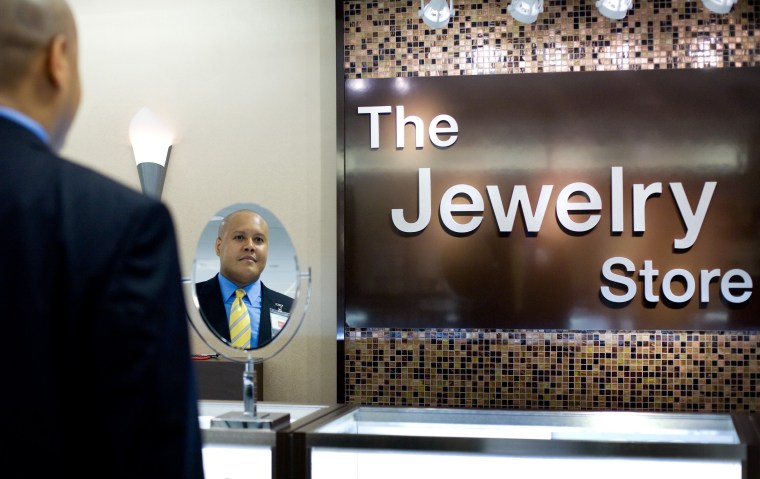Don't count on a job selling sweaters at your favorite department store. Retail jobs from sales associates to managers are harder to find as merchants close stores, lay off thousands of workers — or go out of business completely.
Whenever a retailer does hire employers, it's usually inundated by people hoping for a job. J.C. Penney Co. received 15,000 applications, more than double what it expected, for 500 positions at its new Manhattan store. SnagAJob.com, an online site, said 160,596 applicants applied for jobs at one national department store chain in July, more than twice the number of a year ago.
The overflow of resumes, particularly from people laid off in fields such as construction and finance, gives merchants their pick of the best workers but also presents a challenge for people who want to get started in retail or get back into the business. Some do find that with extra effort, it's possible to get a job that, if not ideal, at least gets them inside the door.
Darren Gray, 44, who had 13 years of banking experience including managerial stints, learned that recently when he applied to the new Penney's.
After the financial crisis erupted last fall, the Jersey City, N.J., resident decided to leave finance and return to retailing, where he worked for six years after college. When Gray applied to Penney's, all the management positions were taken, so he accepted a job as a commission-based jewelry sales associate, which meant up to a 50 percent pay cut. But Gray remains upbeat about his career prospects.
"There's definitely opportunity for advancement," said Gray, who aims to be part of Penney's top management someday. "Sometimes you have to take short-term sacrifices for a long-term gain."
The dearth of retail openings is particularly disheartening because in past recessions, the industry served as a safety net for the unemployed. That net isn't there now, as the most dramatic plunge in consumer spending in decades has led to a rash of liquidations of major chains from Circuit City Stores Inc. to Linens 'N Things. And other companies have been shutting stores around the country and laying off managers.
"This recession is all about the consumer, and spending dropped off because consumers are tapped out," said John Challenger, chief executive of Challenger Gray & Christmas, a consulting firm.
The retail industry, which employs about 11.2 percent of all U.S. workers, has lost 843,100 positions since the recession began in late 2007, Challenger said. That shrinking landscape has meant there's one retail job for every four applicants, compared with one job for every two applicants three years ago, he noted.
There are ways to make your resume stand out. Applicants who are on an executive management track should pad their resume with short-term jobs even if they don't pay, according to Chris Higgins, senior associate director of MBA recruitment at University of Pennsylvania's Wharton School.
Wharton has been working with retailers to develop short-term projects, in areas such as operations and merchandising, for MBA candidates who want to pursue a retailing career.
Cristina Mariaca, 30, who graduated from Wharton's MBA program in May, is wrapping up a three-week project for teen retailer Urban Outfitters Inc. that analyzes total annual compensation costs, including perks like plane travel, for chief executives of 25 of the retailer's peers. The study, which Mariaca was paid for, was commissioned for the company's board meeting and will be used to help set compensation levels for its executives for the following year.
"This might open doors to the firm," she said.
For all levels of experience, David Szymanski, professor of marketing at Texas A&M University, said applicants have to be "more open-minded" to get whatever jobs they can.
Here are other tips for landing a retailing job:
- Focus on financially healthy chains. Pursue job opportunities at supermarket chains and discounters that have benefited from shoppers who are buying only the necessities. Another good place to look is a low-price department store chain. Candidates should do their homework to find out which stores are doing well and go after those jobs, said executive recruiter Elaine A. Hughes.
- Look for jobs at stores where you regularly shop and that you're passionate about, Challenger suggested. That passion and knowledge of the products will come through in interviews.
- Meet the managers: Don't just drop off your resume, but try to meet the store managers to stand out from the crowd of applications, Challenger said.
- Be flexible. Working in retailing can mean grueling work schedules, particularly when it comes to the holiday season. Be open to working any shift.
Mark Smalls, a 25-year-old Savannah, Ga., resident, has applied for more than 70 sales associate jobs at various merchants over the past five months with no luck. He's now working the night shift at fast-food chain Sonic Drive-In and earning the minimum wage just to make ends meet.
"It's kind of hard to break into," Smalls said of the retail business. His goal is to gain merchandising experience at a traditional retailer and then some day run his own clothing store.
Job seekers should play up experience in customer service. Emphasize experience, even if it's an unrelated field such as banking or hospitality.
Gray believes his experience as a branch manager and most recently as a financial adviser in training at Merrill Lynch helped him convince Penney's management he had a flair with customers.
